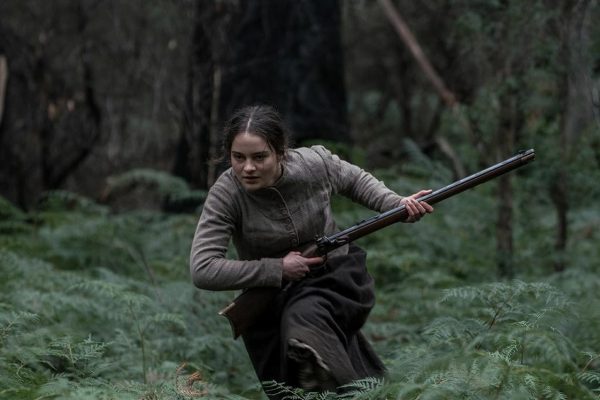For her second film, Jennifer Kent turns to that most disreputable of genre staples, the rape-revenge drama to howl against historical injustice; specifically the bloody, too-often sanitised saga of England’s colonial history and the founding of modern Australia. Set during the Black War, in which British colonialists laughably set about ‘civilising’ the wilds of what was then Van Diemen’s Land, it focuses on two people with their own reasons for fighting back. Unflinching and almost unspeakably harrowing, The Nightingale has provoked disgusted walkouts and even fainting spells, but its remorseless vision and righteous fury are undoubtedly compelling, even though its formidable length is a long time to spend in its dark and chilly embrace.
Clare (Aisling Franciosi) is a young Irish convict indentured to the bitter, brutal Lieutenant Hawkins (Sam Claflin). She longs to be freed to build a life with her husband and baby daughter. Hawkins reneges on his promise to grant her liberty, preferring to parade her in front of his motley brigade of leering Lobsterbacks and periodically rape her when he deems her insufficiently grateful. A fateful altercation with her incensed husband triggers a prolonged act of terrible violence against Clare and her family. She pressgangs Billy, an Aboriginal tracker (Baykali Ganambarr) to help her pursue her tormenters through the Tasmanian bush and exact her vengeance.
Kent uses the relationship between Clare and Billy as a means to establish an interesting dynamic between two peoples who have suffered at the hands of the colonisers. Even among the oppressed, there is a social and economic hierarchy. Clare’s status as a criminal, presumably shipped over on a prison boat, still outranks that of the native tracker. It’s in the slow erosion of this gulf, as Clare’s unthinking racism and Billy’s sullen resentment give way to something approaching common ground, that the film finds its humanity. It’s a tentative friendship forged in the crucible of a shared hatred, but The Nightingale doesn’t lend itself to easy answers.
Franciosi and Ganambarr excel in their roles, with the rough edges of their characters remaining intact. More straightforward are the English soldiers. Claflin finds some subtle notes of thwarted ambition and insecurity in his fairly one-note brute. Damon Herriman as Hawkins sidekick Sergeant Ruse is a study in cruelty and cowardice. In films such as this and Judy & Punch, Herriman is cornering the market in small, abysmal men to the extent that his dual turns as Charles Manson as One Upon a Time… in Hollywood and Mindhunter rank among his less loathsome characters this year.
It’s possible that the film’s refusal to compromise in its vision will work against it, particularly with respect to its potential audience. The violence is horrific but is actually used sparingly. Rather, it’s the prolonged and cloying intensity and the constant undertone of nihilism that really makes The Nightingale such a tough watch. It also arguably lacks the depth of Kent’s lauded debut, the more subtle, grief-riddled The Babadook. The film’s repeated use of rape is so blunt as to barely even qualify as a metaphor for English colonial violations, and the focus on Clare’s story means it isn’t as incisive a depiction of the atrocity endured by the indigenous Australians as, say, Warwick Thornton‘s astonishing Sweet Country.
Nevertheless, The Nightingale is another fine entry in the canon of recent films that are beginning to reckon with Australia’s colonial past with a clear-eyed lack of romanticism, such as Sweet Country and John Hillcoat‘s The Proposition. It dares you to look away from its horrors and its depiction of Tasmania as a Hobbesian nightmare that steadily strips the soul from its new settlers will leave a mental scar that won’t easily heal.
@Filmhouse, Edinburgh from Fri 20 Dec 2019
